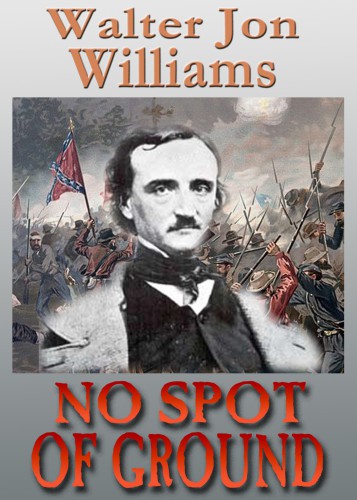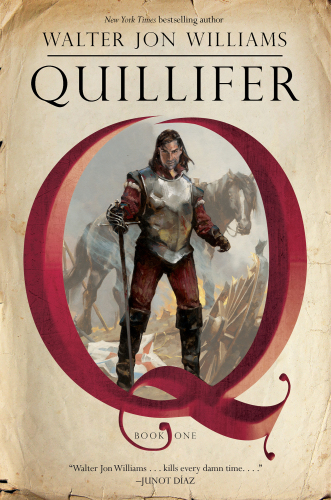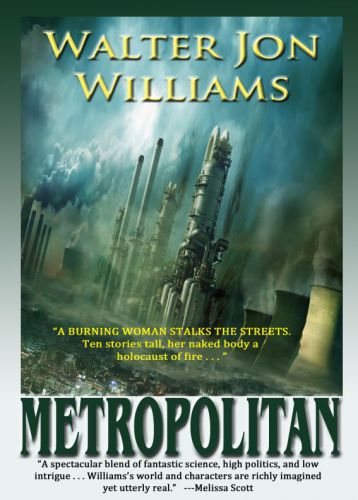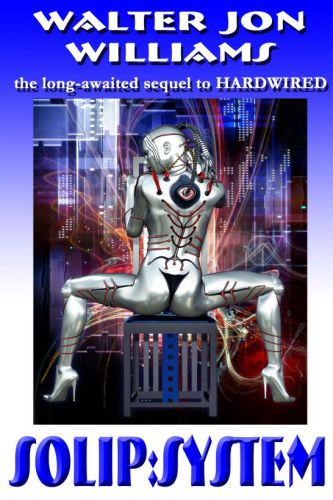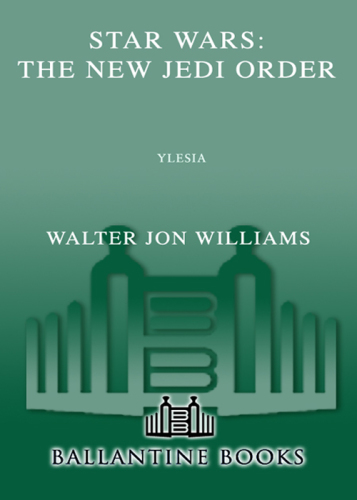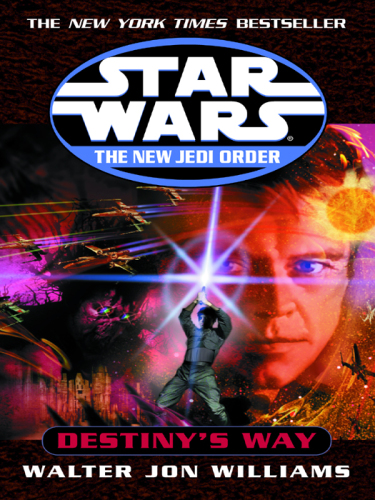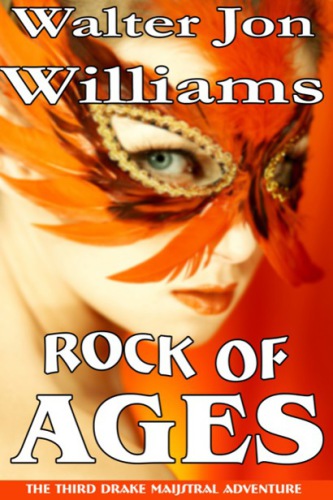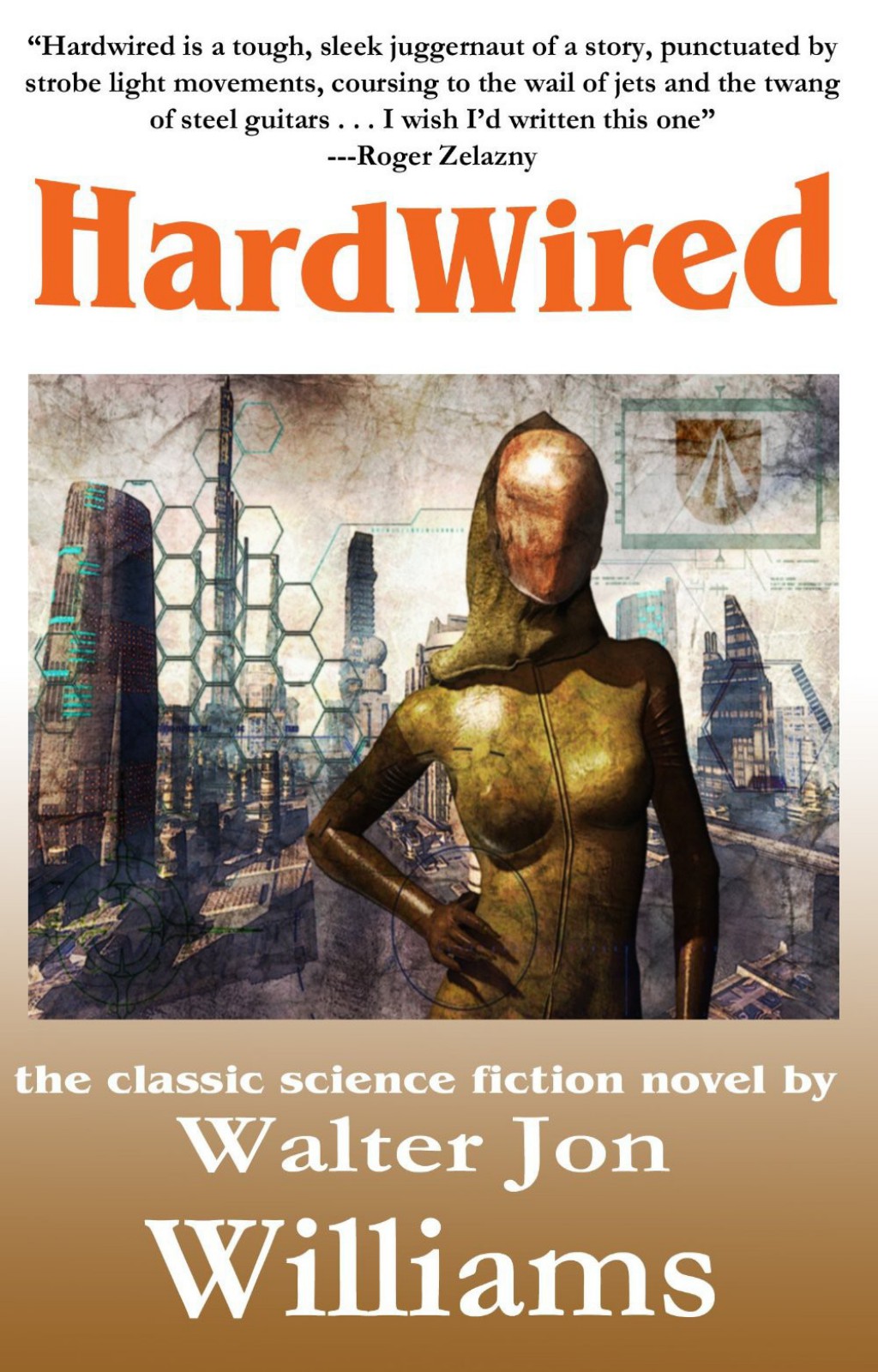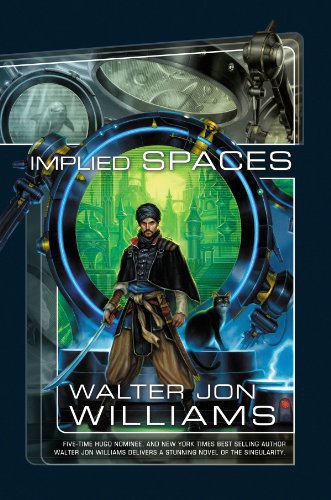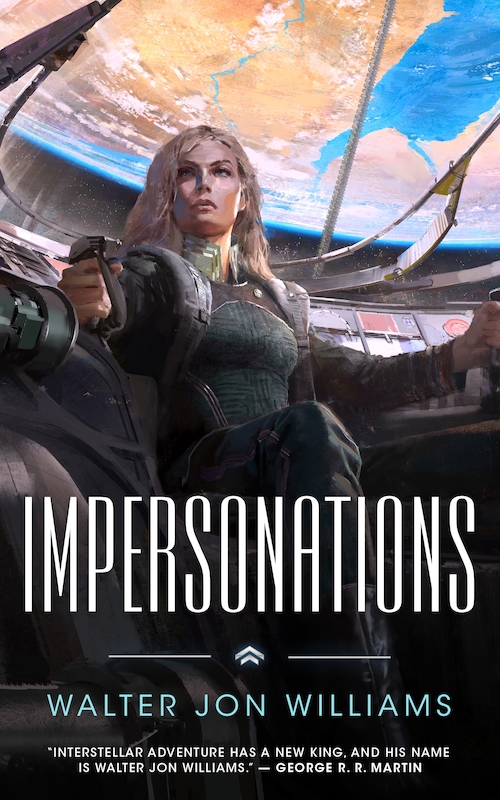oleebook.com
City on Fire de Williams, Walter Jon
de Williams, Walter Jon - Género: English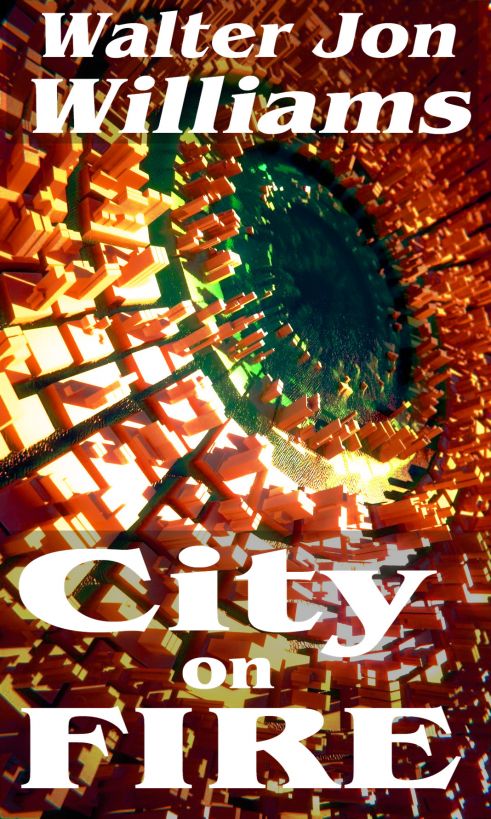
Sinopsis
Nominated for both the Hugo and Nebula Award, City on Fire returns to the world-city of Metropolitan, dominated by plasm, the magical substance capable of both creation and destruction. With her help, Aiah's lover Constantine has established himself in the metropolis of Caraqui---Aiah must fight not only for her revolution and for her place in the world, but for Constantine's very soul.
Descargar
Descargar City on Fire ePub GratisLibros Recomendados - Relacionados
Reseñas Varias sobre este libro
"Plasm makes everything more intense."
Constantine, p.112
Walter Jon Williams' 1997 novel City on Fire is certainly intense. It's also a sequel, though, so please do go read Metropolitan first, before reading this bookor this reviewany further. After all, I may let slip details you don't want to see prematurely about the first book in Williams' tragically truncated trilogy (still, alas, stuck at only two volumes after more than a quarter-century) while talking about this one.
*
In Medias Res
City on Fire picks up right where Metropolitan left offriding along with Aiah on a high-speed transport en route from her home in the Scope of Jaspeer to war-torn Caraqui, abandoning her career and her family to join her lover, mentor and muse, instigator of revolution, the deposed and exiled former Metropolitan of Cheloki: Constantine.
The situation in Caraqui is intense. Headlines (on page 2) scream,
MARTIAL LAW STILL IN FORCE
SURVIVING KEREMATHS DENOUNCE COUP FROM EXILE
But neither Aiah nor Constantine could have anticipated what would happen when they are reunited.
"Do I get what I want, Metropolitan?"
He hesitates, looks at her over his shoulder with a kind of surprise. "Of course," he says. "I thought it went without saying."
p.329
*
Switch and Bait
City on Fire changes focus considerably from what was important in Metropolitan. Most of the worldbuilding seems to be over, as are most of the character introductions. Williams' sequel concentrates on politicsthe civil war in Caraqui, to be specificand on character development. We see no more of the metropolis of Achanos, for example, than a single (albeit sumptuous) hotel room, in which Aiah and Constantine debate their futureand we find out very little more about how plasm works or what geomancy can do, beyond principles already at least introduced in Metropolitan.
In City on Fire, plasm is little more than a resource.
And yet... Williams does reveal some new and exciting features of this world, later on.
Williams' hissing, clanking steampunk (or steampunk-adjacent, anyway) aesthetic makes for some great images, too...The oval screen of Rohder's computer is framed in a polished copper case chased with ornamental scallops and speed lines designed to make the viewer think that the screen, or at least data, is zooming from place to place with mighty efficiency. The ornament fails to convince anyone familiar with the ways of computers.
p.332And while his prose is mostly straightforward, relying on exotic imagery rather than exotic language, Williams does occasionally stray into something perilously approaching style. The repetitions of "massive" I noticed on p.194, for example, started seeming almost poetry.
*
How the Sausage Is Made
The primary driver of tension in City on Fire, though, is political. Williams' portrayal of the back-and-forth of coup and counter-coup in Caraqui, for example, is still enormously exciting to read, although it resonates very differently now (at least for this U.S. reader) after the attempted autogolpe in Washington, D.C., on January 6, 2021.
Williams also explores the consequences of genetic manipulationthe so-called "twisted" play a much larger and more significant rôle in City on Fire than they did in Metropolitan. Quite plausibly, the manipulated humans of Caraqui are still stigmatized, even though the techniquesmagically aided by plasmthat created them are both ancient and commonplace.
Other parts of City on Fire seem even more plausible:"Theocracies, when they are not corrupt, are always vicious, always trying to impose their moral absolutes on an imperfect humanity. But they always sound attractivetheir language seduces, ecclesiastical architecture, music.... Why not form a government of godly, disinterested people? Why not let them direct society in harmony with divine inspiration? Why not make people good? And so, on this promising moral premise, we find the coercive powers of the state united with the coercive powers of faithpeople must be made good, the state must make them so when religion cannot; and if one is not good, one is not merely disobeying a custom or a law made by mortals, one is defying the universal truths behind the operation of the universe, one is opposing all that is true, all that is divine, and so the penalties must be savage for such willful perversity, such obstinacy in the face of revealed truth...."
Constantine, p.408I suspect this is actually Williams talking for himselfbut either way, it certainly resonates with me.
*
In Medias Res, Redux
City on Fire was not quite as satisfying as Metropolitan, I'll admitand the hardcover was very cheaply made, too, the pages of my copy already yellowing, its boards warping. However, this volume does have more of an endingalthough, even so, Williams still leaves us wanting more about Aiah and Constantine, the Dreaming Sisters, the Shield... and the world under the Shield.
I know we'll probably never get another entry in Walter Jon Williams' Plasm series... but at least we have these two.
4 s Peter Tillman3,716 404
2008 reread notes: 4.5 stars, Not quite as good as I recalled. A lot of time spent blowing things up, plus middle-book issues. Still a near-great book, but with no real resolution. The review to read is Jo Walton's, https://www.tor.com/2011/09/27/transf...
Planned to be a trilogy, but.... Publisher issues. WJW's blog has the grim details:
http://www.walterjonwilliams.net/2012...
The next book will be called Heaven in Flames.
It would be great if he got back to the series. Probably wont happen. But WJW hasn't quite given up hope, so we shouldn't, either....fantasy science-fiction4 s prcardi538 84
Storyline: 3/5
Characters: 3/5
Writing Style: 3/5
World: 3/5
This is a duology Im going to remember. Ill remember it more for the first book, however, than the second. Theres probably a unique formula to constructing the duology, something that allows it to do something that a standalone volume cannot while also providing an arc distinct from that predominant in trilogies. Whatever essential ingredient it is that brings out the best in a 2-volume series, Williams did not have it. This is one of those books that rides on the successes of its predecessor. And that predecessor had a lot to extol. The urban worldbuilding was imaginative. The mechanics of the magic-as-science were entertaining. The themes on race and class were confrontational. The authorial voice was measured. City on Fire, at least for the first half, is essentially a continuation of the first book. That first 50% would not have been out of place tacked onto Metropolitan . It fit well enough as the first half of a second book, but the worldbuilding and insights had mostly been expended in book one. This left the beginnings of City on Fire more as the resolution to the first story than the start of the second. The second half of City on Fire does finally turn to promising and intriguing matters. Hints of worldbuilding and that measured insight and commentary slip back into the story. Oddly, this half ends abruptly with only the barest conclusion. Williams needed those 280 pages he used at the beginning of the story. If this second was to best the first, it needed more space with which to develop its own identity. Williams seemed to realize too late what he wanted to do with the tale and did not leave himself enough space to work with. So we get an ending, but it is hard to believe that this is really the ending Williams wanted to tell or fans wanted to read.
Even though I found this to be inferior to the first, the series does make me want to look more into the author. Today it might be less acceptable for a middle-aged white man to write from the point of view of a young minority woman of color, but I was impressed with the attempt. Both of these had a romance angle to them that I found a little repetitive, but Im curious to see what else he dabbled in and created.dystopia magic rated-r ...more2 s Liviu2,322 654
If you read my thoughts about Metropolitan, you will get a feel about the series and why this was my 4th or 5th read of it so far.
http://www.goodreads.com/review/show/...
As I do not want to spoil too many things just a few notes.
City on Fire starts where Metropolitan ends with Aiah taking Constantine's offer and arriving in liberated Caraqui - though not a native, Constantine is one of the new leaders though seemingly of less importance than the officer leading the coup and the slimy cleric who turned his cloak and supported the revolution - where somewhat to her surprise she is appointed head of the new "Plasma Recovery" dept under minister Constantine.
Using the skills learned in Jaasper and finally having carte-blanche to bust the local mafia and the plasma black market in the name of the revolution, Aiah soon shines in her job and slowly she becomes a magnet for Barkazil from all over, while deftly navigating the treacherous waters of Caraqui where the various groups compete for power
But the revolution is under peril as the survivors of the former kleptocracy and the dons of the busted mafia convince the neighbors that they are better back in power, while internally the conflicts between the various Caraqui interests also threaten its survival and of Aiah, Constantine etc too.
Constantine's New City ideals are still powerful and together with Soryah's skilled intrigue capabilities and Aiah's recovered reserves of plasma (and her new found fame as some mercenary Barkazil brigades are famed all over the World City and they may just follow a Barkazil 'world figure" hoping to recover their native state now under foreign protector-ship) may make the difference between death or survival; on the other hand Constantine has his dark secrets, not to speak that there is space for only one powerful woman in his life and Soryah does not competition...
City on Fire is even better in some ways than Metropolitan and I so wish the author will write more as the ending while at a decent point and not on a cliffhanger (with main threads solved) promises so much about what was supposed to come before the series' untimely cancellation...genre-fantasy genre-sf read_20122 s Tom223 38
There's good news for those readers that enjoyed Walter Jon Williams' book "Metropolitan": There's a WHOLE lot more where that came from.
"City on Fire" is the 500 page doorstop-sized follow up to the first novel. It's got more of everything a fan could possibly want. More about the immense, world-spanning city? Check. More about the magic- 'plasm,' a force which might be described as feng shui on steroids? Check. More about the genetic mutants known as the 'twisted'? Check. What about the mysterious 'shield'? Check. The further machinations of politician Constantine? Check. Oh, and more on that evil, body-snatching creature of the plasm known as Takoen? Check and check.
First and foremost, though, "City on Fire" is a political thriller. It concerns the previous book's protagonist Aiah as she follows Constantine to the metropolis of Caraqui in hopes of securing herself a new job as a minor government functionary and instead finds herself rising through the ranks and becoming a celebrity and political player in her own right.
And here we get into the spoiler territory. If you haven't read the first book, so you might want to skip the next three paragraphs.
At the end of Metropolitan, Constantine and his allies had deposed Caraqui's corrupt oligarchs and taken over. So far so good. But they have their work cut out for them. When Aiah arrives expecting a minor position and a pat on the back, she is instead deputized to create a "Plasm Enforcement Division" from whole cloth. Immediately she is pitted against the Silver Hand, the local flavor of the mob, the city's chief plasm thieves. But they will soon be the least of her worries.
Caraqui faces threats from without and within. Its neighbors view its new government with suspicion, if not downright hostility. Political factions are vying for power. Tensions between the genetically 'twisted' and the majority religious sect run high. And the Ceremath family, so recently deposed, still have some living members who would their old city back.
Aiah is gratified that Constantine is pleased to see her, but her old rival Sorya, now head of the secret police, is not. Aiah suspects Sorya is planning to stab Constantine in the back, and she also begins to believe that even Constantine may just be using her as a pawn in a complicated game. The peace of their new city soon proves temporary, and they are plunged into war as Aiah, Constantine, and their allies try desperately to hold everything together. Still on the scene is the 'hanged man', Taoken, now more dangerous than ever. And a strange group of plasm mages known as the Dreaming Sisters keep making elaborate displays in the sky, of which Aiah's face is sometimes a part. For Aiah, staying alive will mean choosing unly allies, forging her own destiny, and learning to play the political game.
"City on Fire" is a massive and complex book not just about sci-fi magic, but about political intrigue, revolution, civil war, betrayal, propaganda, and statescraft. I enjoyed it immensely.
The only quibble, and it is not necessarily a dealbreaker, is that the third novel implied at the end of this one was never written. While we don't exactly end on a breathless cliffhanger, there is unquestionably more of the story to tell. I dearly hope that someday we get that final volume. I would still wholeheartedly recommend reading this one.1 Outis152 32
Less noir, more war.
And more government. Yes, minister.
The writing is improved (now with more wittyness!), the plot is tighter, the structure is neater, more things go spectacularly wrong and there is some resolution at the end. I'm hardly satisfied though and I hope Williams eventually gets around to writing the long-delayed sequel(s).
But what was possibly the biggest problem with the first books gets worse: Mary Sue. You don't need to be sexist get tired with the ever-amazing Aiah who's now explicitely gifted by the gods or something on top of her preposterous luck and improbable skills. I won't spoil the plot but it doesn't stop there.
The romance is getting less plausible as well, though there's a nice twist at the end.
Another problem with City on Fire is that it's a bit condescending, especially in the first part of the book where the reader is unsubtly reminded about everything that was established earlier. If it was only a matter of accomodating readers who didn't read the first book, OK (though it could have been handled better). But it doesn't stop there.
There are other changes between the books.
Most obviously, mystical stuff is introduced. It's pretty well-done. Mysteries are waved in front the readers' face. I'm less crazy about that.
Our heroine gets even more angsty, pathologically so. That was well-done too. She's more responsible but even more out of her depth. In spite of the Mary Sue syndrome, I found the new Aiah on the whole even more endearing.
Trans-humans become a bigger deal and we get into the realm of unsubtle political allegory.
And so on...
In other words, even though it's a direct continuation of the first book (which picks up right where it left), it isn't more of the same.fantasy politics steampunk1 Anastasia187 26
I d it a lot. Sequel to "Metropolitan," a science fantasy hybrid. With every book by Walter Jon Williams I read, I become more and more of a fan. He's good at capturing city/wartime politics and making it very exciting. Also great at sustaining a believable female POV.
What happens: Aiah goes to work for Constantine in the newly "liberated" city-state of Caraqui, a government job policing plasm use. There's politicking and war, the unsettled question of the Hanged Man (a demon of living plasm) who continues to claim victims, the nature of plasm, Aiah's growing confidence and powerbase, her relationship with Constantine.
I definitely recommend "Metropolitan" if you're new to Walter Jon Williams, and "City on Fire" is a worthy sequel. I can only hope WJW writes the conclusion one day. (The ending is satisfying, but there is more story to tell.)cityscape-fantasy1 Pamela60 2 Read
Another great book
Aiah has come a long way since growing up on the dole in Old Shorings. She realizes, more and more, how much Constantine has made her Constantine's creature. But, as she gains more of an understanding of her own, personal power, she may break free of Constantine altogether. 1 Benj577
A pretty good sequel to Metropolitan. Perhaps too much of the book is spent on the mechanics of running a city and then running a war.
This is clearly volume 2 of a trilogy, but I understand that the third book (provisionally titled Heaven in Flames) isn't written yet - we need it!
The Dreaming Sisters are superb, and need further explanation.1 Chris Branch606 17
I guess I shouldnt be surprised at the sophisticated writing here, but this is only the second book Ive read by Williams, after Metropolitan, the first in the series, many years ago. I had positive memories of that one, but only recently came across the sequel (shout out to Big Chicken Barn Books & Antiques in Maine). So this one was also fairly enjoyable, largely due to the polished and professional writing style.
On the other hand, the plot, for me, was a bit thin. The main conflict is barely hinted at in the first three quarters or so of the book, with the action instead focusing on the ongoing civil war. This would be fine as a backdrop, but instead, the events of the conflict take center stage, to the exclusion of the more interesting undercurrents of the story. The various military, police, and espionage actions are covered in detail that seem they should be moving the story forward, but for most of the book thats not the case. The relationships among Aiah, Constantine, Sorya, and the others involved in the Caraqui government are more engaging, but even they are conveyed in a way that seems less than consequential in the scheme of things. So for me, the various battles and the shifting allegiances of the power players come across as one thing happening after another, lacking the urgency of a powerful arc.
Theres not much in the way of twists, and in the end, when we finally arrive at the climax, it seems a bit rushed, and less satisfying than it should have been. The ending isnt bad, just not worth the time it took to get there.
But I remain impressed with Williamss writing, so although many readers and critics seem to think this series is his best work, I think Ill try something else by him when I get a chance.science-fiction Braxiatel93 2
As always, the characters are really really boring (outside of Romus, Rohder, Ethemark and to some extent Sorya) but the worldbuilding is amazing and carries the whole series. Compared to the first book, this is military heavy and thankfully contains significantly less exposition and awkward philosophising while bringing about more interesting ideas. The revolution and politicising, as it is depicted, also feels very realistic.
Although the romance is just awkward and I think that the two leads (Constantine and Aiah) are pretty weak characters.
The worldbuilding is kind of a mix between the Divine Cities (which I dropped) and anime Darker than Black (minus the Strugatsky-esque horror). It's a shame that a third book for this hasn't been released as of yet; I want to know what lies beyond the Shield. Josh Caldwell104 1 follower
With both books in this series, I wasn't really bought in to start, but as the story goes on I got more and more into it. I think the characters are relatively good, and Aiah starts to become more self-motivated in this book. There are still weird power dynamics combined with sex that feels weird to me though. Overall, I think the Metropolitan series and City on Fire are fun (if often stressful) and present some interesting ideas (some of which remind me of the Broken Earth trilogy by N.K. Jemison), but it's mostly a story about politics and power - which honestly is too much for me some days (in the current world). I hope that maybe one day there will be a 3rd book (apparently there was something with his editor/publisher that stopped the momentum there). Lisalena76 8
Unfortunately, this series started out with a futuristic, sci fi premise but it became steadily more of a bizarre fantasy story as the plot moved on. Since I much prefer hard sci fi to fantasy, and because the preview led me to believe this series fell more into the category of science fiction rather than fantasy, I can't give it more than 2 stars.
As a side note, I sure wish WJW would create more stories his super clever, cyberpunk novel HARDWIRED. I wish he didn't keep falling further down the rabbit hole of fantasy fiction. Oh well.fantasy Vanessa Perry164 1 follower
So is the city on fire Paul Close758
Didn't finish (up to ch. 15, half way through 500 pages). Somewhat slow moving and shallow, very loosely written. Constantine is unbelievably perfect, and the book gushes over him.sf-fantasy Jomafe-44
The book is really fabulous. Nicolas1,307 69
Faisant suite aux aventures déja décrites dans Plasma(1), ce roman nous décrit la suite de lascension dAyah, dans un contexte désormais beaucoup plus politisé et beaucoup moins magouilleur. Il y a donc moins de petites astuces, beaucoup plus de bureaucratie et surtout de politique. Et, étrangement, jai beaucoup aimé. En effet, la découverte des subtilités politiques de ces étranges métropoles vues par les yeux de cette débutante est tout à fait fascinante et sans doute basée sur une observation assez attentive de ce qui peut se passer chez nous. Jy ai également parfois retrouvé des réflexions qui mont rappelé Machiavel, Sun Tsu et autres fondateurs de la mauvaise pensée politique. Bien sûr, par moments, le plasma passait sa tête par la porte pour agrémenter ces débats de scènes daction très sympathiques. Hélas, je ne vois pas quoi dire dautre pour défendre les qualités de ce bouquin tout à fait inclassable et réellement réussi.
(1) Pour lequel il semble bizarrement que je nai pas darticleanticipation combat fantasy ...more Dan HenkAuthor 11 books31
No where near as good as his book Metropolitan, this sequel mainly details a counter civil war started by the civil war the main character in the previous book started.
All the cool, new concepts, such as a worldwide city and a magical force called plasm, are laid out in the first book. This has very little new, just fighting between parties you care little about, and endless drama. Hints of things that are truly intriguing ( that a shield covers the world and they have no idea who built it) are only briefly addressed and then never answered.
So, not a terrible read, but kind of the mid Matrix movie, all the cool new concepts are in the first book, this one just feels it is stalling. Kat HeatheringtonAuthor 5 books27
very solid, character-driven, intriguing speculative fiction (it would be SF but it has magic in it). the plot doesn't quite resolve --there are a few threads left hanging -- but it doesn't appear to have a sequel, either. still, it doesn't leave the reader unsatisfied, so much as curious and intrigued. very well executed. JamesAuthor 4 books26
The sequel to Metropolitan, this novel's not about the revolution. It's about the messy business of consolidating power after the revolution, and the compromises that pure-hearted revolutionaries don't have to make until the shooting is done. Easily as good as Metropolitan. Maybe better. NicoleAuthor 5 books47
Better than Metropolitan--even more compelling and complex.sci-fi Jerome Plapp8
Pretty damn good. I think it was technically superior to Metropolitan though it also ended in a weird way which seems to leave room open for another sequel. Terry O'BrienAuthor 2 books
A fine sequel to Metropolitan, but a little too long and involved than its predecessor. IT bogs down with the constant warfare about half-way through the story line. Matteo FulghèriAuthor 1 book19
Abandoned it around page 80. Clichés and stereotypes one after another.
Is this the same guy who wrote Aristoi?!?abandoned SFReader342 22
Autor del comentario:
=================================
